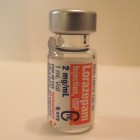
Litigators from the Mental Hygiene Legal Service, a branch of the New York State Supreme Court, and officials of the New York Justice Center for the Protection of People with Special Needs are independently investigating the use of forced antipsychotic medication on patients at Bellevue Hospital and other psychiatric hospitals in New York City.
In December 2015, City Limits reported on the use of forced medication in Bellevue Hospital’s psychiatric emergency room. Doctors there have administered forced antipsychotic and sedative medication to compel blood work from patients who refuse the procedure during the admissions process, possibly violating the state law that regulates the use of involuntary medication.
The hospital has insisted that its practices comply with the law.
The office of the Mental Hygiene Legal Service (the state’s public defense agency for psychiatric patients) that is located at Bellevue filed a formal complaint in March 2015 to the New York Justice Center about the hospital’s use of involuntary injections to force patients to comply with admissions procedures. The complaint cited medical records of nonviolent but noncompliant patients who had received involuntary injections, which are legal only when patients are immediately dangerous, along with court testimony by Bellevue psychiatrists alluding to the use of forced medication to compel blood work as a standard procedure at the hospital.
Ten months later, the Justice Center’s investigation is ongoing and may result in criminal charges. Diane Ward, a spokesperson for the Justice Center – the two-year-old state agency that investigates abuse of psychiatric and developmentally disabled patients – confirmed in an email that the Bellevue complaint “remains an active Justice Center criminal investigation.”
Reporting by the Associated Press in October 2015 found that the Justice Center had brought criminal charges in less than 2.5 percent of the abuse and neglect cases it had substantiated since the beginning of 2014.

Lorazepam (also known as Ativan) is one of the drugs commonly used. Click to read Ben Hattem’s original investigation.
As the Justice Center pursues its investigation of Bellevue, litigators from the Mental Hygiene Legal Service’s Second Judicial Department – which covers Brooklyn, Queens, and Staten Island – have now opened their own investigation into the use of forced emergency injections and antipsychotic medication as so-called “chemical restraints” in psychiatric hospitals citywide.
“The use of chemical restraints in NYC hospitals has been and continues to be a concern for MHLS,” said Lisa Volpe, who heads the special litigation unit of the Second Judicial Department, in an email. “We are formulating an investigation to look into the use of chemical restraints as part of our overall investigation into the use or overuse of restraints, and expect that the investigation will be ongoing for quite some time,” she continued.
The state Office of Mental Health, which licenses Bellevue’s psychiatry department, has nearly eliminated the use of chemical restraints in state-run psychiatric hospitals, according to data obtained by City Limits. But Bellevue, which does not consider its forced medication to be a chemical restraint, used involuntary injections 95,959 times in 2014.
Bellevue spokesperson Evelyn Hernandez told City Limits that there have been no changes at Bellevue regarding doctors’ use of forced antipsychotic medication to compel blood work in the psychiatric emergency room.
“We regularly review the quality of care for services provided to patients and we update our policies as appropriate,” Hernandez wrote in an emailed statement.
Ana Marengo, a spokesperson for the New York City Health and Hospitals Corporation (HHC), the public health care network that includes Bellevue, did not respond by press time to questions about whether HHC is reviewing the use of forced medication at Bellevue.
Ben Hattem’s reporting was done in partnership with the Investigative Fund at the Nation Institute, with support from the Gertrude Blumenthal Kasbekar Fund.









2 thoughts on “State Investigates Use of Medication in NYC Psychiatric Hospitals”
If a person is not Bi-Polar or schizophrenic ans is suffering from Anxiety disorder or Panic disorder by giving these Patients Anti-Psychotic medications you as a Doctor are signing them a Death and Suffering certificate wake up the Psychiatric Teams in Hospitals, stop this madness with Powerful Drugs. Many Patients are environmentally sick from there living Condition’s, stop this madness and torturing patients.
Psychiatry and the use of chemical restraints are a crime against humanity.